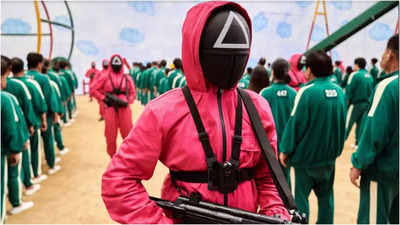‘Squid Game’ Creator Reflects On Struggles And Inspiration Behind The Scene; As Second Series Gets Set For Release In December.
The creator of Squid Game Hwang Dong-hyuk, has opened up about the toll of creating his globally acclaimed series, revealing he lost nearly nine teeth due to stress during filming. Speaking on set while working on the much-anticipated second series of the Netflix hit, Hwang shared insights into the challenges, motivations, and deeper meanings driving the continuation of his dystopian narrative.
Released in 2021, the first series of Squid Game became a cultural phenomenon, captivating audiences with its dark portrayal of wealth inequality. The intense storyline follows contestants, burdened by debt, as they compete in lethal versions of children’s games, all for a staggering cash prize. Despite the global success, Hwang initially vowed not to pursue a second series due to the emotional and physical strain of production. However, he admits financial considerations played a significant role in his decision to return.
“Even though the first series was hugely successful worldwide, I didn’t make much from it,” Hwang explained. He revealed that the opportunity to produce the second series has provided him with a chance to achieve fair compensation while also allowing him to explore unresolved storylines. This time around, he aims to expose societal divisions by adding new layers to the story, introducing fresh characters, games, and themes.
In the upcoming series, the previous winner, Gi-hun, re-enters the deadly competition in a bid to dismantle it from within. With each game, contestants must choose between two factions, fuelling conflict and reflecting Hwang’s concerns about today’s increasingly polarised world. He notes that his bleak outlook on society has intensified, pointing to global conflicts, climate change, and widening socio-economic divides as sources of inspiration. “We’re in an era of ‘us vs. them,'” he observed, highlighting how ideological divides are now ubiquitous.
Hwang’s concerns resonate beyond the story itself. His struggle for fair pay and creative rights has illuminated the broader issues faced by South Korean creators in the streaming era. When Squid Game initially aired, Netflix compensated Hwang with a modest upfront fee, but he was excluded from the profits it generated — estimated at around £650 million. This practice, according to Hwang and his peers, is increasingly problematic in South Korea, where outdated copyright laws limit creators’ access to royalties.
The rise of global streaming has spotlighted South Korean content, but creators often find themselves financially undercut by streaming giants. Many are advocating for legal reforms that would require companies to share their profits with creators. A collective of Korean writers, actors, and directors has emerged to challenge these inequities, with government officials acknowledging the need for change. Yet, the industry remains slow to adapt.
As Squid Game’s second series prepares for release, Hwang hopes that his experience will help drive fair pay discussions forward. In his words, “I constantly asked myself, ‘Do we humans have what it takes to steer the world off this downhill path?’ Honestly, I don’t know.” Fans may not find the answers within Squid Game but Hwang promises to address longstanding questions about the game’s origins and the masked Front Man’s motivations.
With the new series scheduled to release on Netflix on 26 December 2024, Hwang is likely to face more demanding challenges. Yet, despite the price he’s paid in stress and dental pain, he remains resolute in his mission to use storytelling as a lens on humanity’s darkest struggles.



